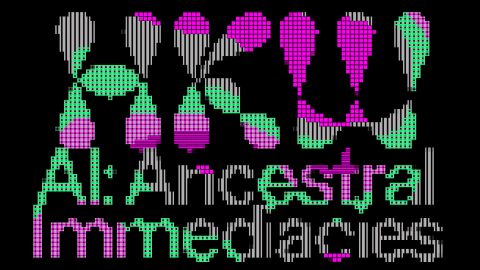AI (Ancestral Immediacies): Alterlife/Afterlife
On Technologies, Consciousness, and Non/Being
Screenings, Performances, Conversations, Keynotes, Installations
24.–26.5.2024
All Dates
This edition of AI: Ancestral Immediacies takes life as a condition that is, in many ways, already emerging through and with technology, as an alter-life, or afterlife. Alterlife/Afterlife. On Technologies, Consciousness, and Non/being proposes that clear-cut divisions of life and non-life are open to alteration; that these boundaries are porous and permeable, as are the bodies subject to these divisions. For the condition of being alive today not only means technological saturation but embodied change and multiplicity due to technological exposure. It entails the deep-seated question of what human exceptionalism might mean, now that technological production is increasingly autonomous, invisible, ubiquitous—and potentially conscious.
As new media technologies such as AI (Artificial Intelligence) are increasingly driving social and environmental change, the divisions between life and non-life are undergoing recalibration. In particular the condition of life after technological ubiquity is pertinent to how our future socialities might unfold when our discarded devices seep into the fabric of the earth, emitting chemicals into the environment, and unknown substances having unknown effect on bodies and worlds. The toxicity of electronic waste seems to also permeate into our screens where deepfakes are weaponized to take on a life of their own, and face filters are implemented in a long history of hostility towards the other and the self. And yet, the idea of sentient objects and conscious machines also holds the promise of recognizing and empathizing with an absolute other, even if the full extent of its interiority remains forever unknown and irrelevant to its status as subject. It is perhaps an irony of history that the humanoid robot Sophia is the only being that has been granted citizenship rights while fully maintaining her interior opacity. From toxic exposure to e-waste, from self-conscious holograms to digital doubles of the dead still living their best lives, the normative conditions of living no longer seem to match the current proliferation of autonomous, self-conscious, and wilful social agents, of animate objects, social media profiles posting in the name of the deceased and advocacies for robot sensibilities.
Instead, life on earth, along with its proximity to agency and free will, its ability to desire and its unavoidable pending demise, is reconfigured within the uneven terms of historically and materially-distributed technological constellations. Drones, bots, and deepfakes recalibrate the terms of life and non-life, consciousness, and agency, and seemingly, even relationships to the divine. What seems urgent and new could be an adaptation of things long gone, when automated technologies discover their ancestry within golems, monsters, and thinking stones.
From the homunculus to contemporary bots, humans as creators are faced again and again with the wilfulness of their creations. Framing AI in this longer lineage of almost-, non-, and anti-humans reveals how the vibrancy of the world has always extended beyond the human, and how the human itself is conditioned by the objects and systems that enable its performance of liveness. If it is possible to encounter all that it means to be alive today in drones, plants and dreams? Is the present moment not an opportunity to consider human creations in their unequal effects on how we understand life and non-living?
Alterlife/Afterlife interrogates what it means to be alive against the backdrop of sentient, conscious, and desiring machines from the homunculus to artificial general intelligence. It does so by taking into consideration the long history of sentient objects as well as a revision of humans and non-humans deemed as non-sentient. Through performances, lectures, conversations, and screenings, the programme interrogates animism, anthropomorphism, and the cultural afterlives of human and non-human data. How do digital technologies that materialize in memorial sites and deadbots remediate ancient rituals of burial and acknowledgement of the dead—how do they urge us to stay alive?
Free entry. All events and conversations (predominantly) in English with German translation.